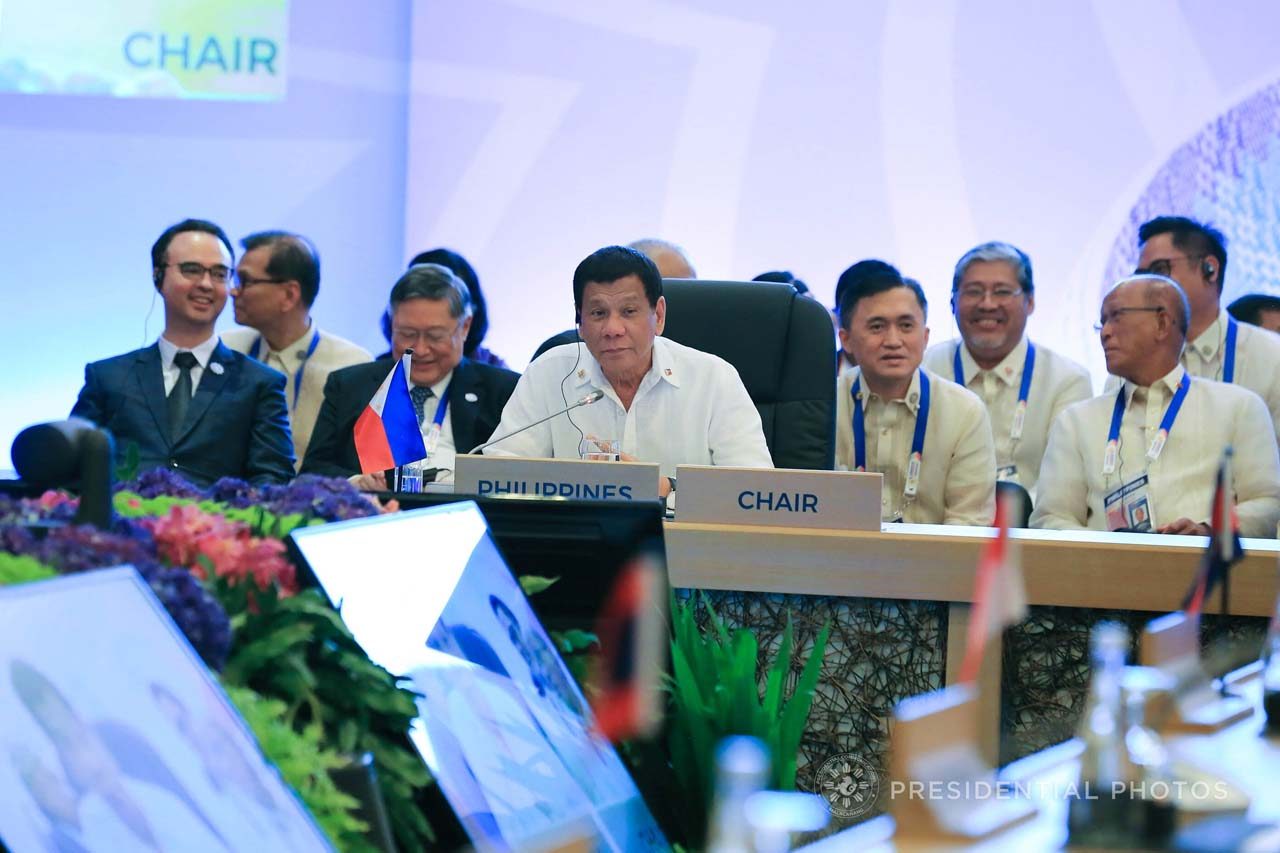SUMMARY
This is AI generated summarization, which may have errors. For context, always refer to the full article.

President Rodrigo Duterte seemed to relish at least one responsibility he had as host of the 31st Association of Southeast Asian Nations (ASEAN) Summit and Related Summits: asking the media to leave the room during meetings with other leaders.
In every summit or session with other heads of state or government, Duterte was tasked with asking videographers and photographers to step out of the meeting room at a certain point of his chairman’s remarks.
During the first few meetings, Duterte made the request in a normal manner, reading the request from his prepared speech.
But as the ASEAN summit progressed, he became more casual and spontaneous with his words to the media.
“At this juncture, it signifies the end of our open session, and I would like to request media to leave us alone,” said Duterte during the ASEAN-US Summit on Tuesday, November 14. Members of his Cabinet could be seen behind him smiling at the remark, so characteristic of the President.
At the ASEAN-Korea Summit later that day, Duterte said he is forced by protocol to “respectfully, most respectfully request the media to disappear,” eliciting some laughter from reporters watching his speech from the International Media Center at the Manila World Trade Center.
After his opening remarks at the ASEAN-Canada Summit on Wednesday, Duterte phrased his request with the help of one of his favorite Bible verses, Ecclesiastes 3:1-8.
“It is said that there is always a time for everything under the sun. And I am addressing it to the media. A time to join and a time to not join,” he said.
At a later Wednesday summit, Duterte changed his tone, saying he, in fact, wanted media to stay for the entire meeting but had to abide by the dictates of the organizing committee.
“I’m sorry, but if I had my way, I’d invite you to participate. But the problem is the working papers, and this is not my words, our open session ends here,” he told the media.
He repeated this tone at the East Asia Summit.
“I know that you like it here. I want you to participate. The problem is, the working papers of the Secretariat do not like you,” he said.
He didn’t stop there. Instead of keeping the customary dismissal of media short and sweet, Duterte continued playfully, “It’s not us. We love exposures to media. We are almost all politicians here. But the Secretariat is stiff.”
His colorful way of asking the media to leave the meetings began with his bilateral meeting with US President Donald Trump.
After a reporter tried to ask Trump about whether he would bring up human rights violations with Duterte, the Philippine President said the media better leave so the two of them can talk more comfortably about sensitive issues.
“We would be talking on matters that [are] of interest [to] both the Philippines and [the US]. With you around, guys, you are the spies,” said Duterte.
Thanks to the media
But before the ASEAN Summit’s events were over, Duterte acknowledged the work of journalists who covered the international conference.
In his last ASEAN press conference on Tuesday night, he said, “I wish to express my appreciation to the members of the media for your coverage throughout the year of the Philippines’ chairmanship of ASEAN.”
Describing media as “invaluable partners” in raising awareness about ASEAN, Duterte told the roomful of reporters and cameramen, “I thank you for getting that message across to the public.”
The fiery Philippine leader has a complicated relationship with reporters, aware of their power to record his deeds as part of history but also smarting from their criticism of him and his administration.
He has launched insults and threats to certain media organizations and journalists but has also invited members of the press to Malacañang dinners. – Rappler.com
Add a comment
How does this make you feel?
There are no comments yet. Add your comment to start the conversation.